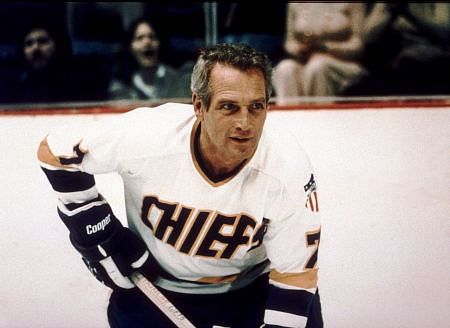



The brilliance of Slap Shot, lies in its analogies to sport and
life. A last-place team is folding in a burned-out city that is itself
being abandoned. The violence that contaminates hockey also menaces (and
titillates) our whole society. The players' wives, dragged around to
strange new cities, classically represent all the displaced housewives
of transient America. The hero (Paul Newman), a washed-up player-coach,
is in his athletic dotage. He is spent and rejected, a premature
metaphor of what real old age means in this country.
 Compared to, say, Rocky, a fairy tale that succeeds because it
is never untrue to its premise, Slap Shot is a supposedly
realistic view of a sport and of life. But it fails because it is false
to everything it fancies itself so realistic about. Alas, it is nothing
but a cheap shot.
Compared to, say, Rocky, a fairy tale that succeeds because it
is never untrue to its premise, Slap Shot is a supposedly
realistic view of a sport and of life. But it fails because it is false
to everything it fancies itself so realistic about. Alas, it is nothing
but a cheap shot.
Violence is at the core of the film, as violence truly is in real
hockey. The woe-begone Charlestown Chiefs are doomed once the factory is
closed and (ugh!) "10,000 workers are placed on waivers." But the team
is magically revived because three sadistic brothers are imported from
the wilds of Canada to brutalize the opposition and beguile the
barbarians in the seats. Sell-outs! First place!
All of this is fair enough, except that we cannot take any of it
seriously inasmuch as the very point of the film, the violence, is
played strictly for laughs. The burlesque savagery is so in the spirit
of the oldtime Tom and Jerry cartoons that I wondered when one of
the Chiefs would hand an opponent a large black bomb.
The whirlgig direction, by the usually well-disciplined George Roy
Hill, runs amok with moments of putative satire wedged amidst heavy
slices of life, like putting peppermint patties in a lunch-meat
sandwich. The dialogue by Nancy Dowd is as puerile as it is
unnecessarily vulgar. Apparently Nancy Dowd believes that male
camaraderie can be instantly created with a whole lot of garbage mouth.
Well, of course, the ----ing broad is correct in her assessment that men
in groups employ plenty of dirty words. You bet. But what she apparently
fails to realize is that they use them casually, as throw-aways. Slap
Shot is utterly betrayed by its language because it makes a point of
its dirty words, it smirks at them -- and men don't do that; not in the
army, not on hockey teams, not in the Watergate tapes, not even, for
that matter, in Rocky.
Newman, in what begins as a very affecting scene with the team's
female owner, ends up merely aimlessly vile. I would have been
embarrassed for Newman, but by this point it was apparent that the role
of the old player-coach was lost on him. This is as disappointing as it
is confusing, for no leading man has ever made such a graceful
transition to character parts as Newman. Yet, as marvelously as he
played the foolish, fading Buffalo Bill in his previous film, so did he
botch it here.
There is no more pathetic a male figure than the athlete going over
the hill. The wan, empty posturing of Joe Namath, almost an overnight
has-been, is all we require for available evidence. Slap Shot's
player-coach should properly be a lost, fey figure, desperate at the end
of the road. That's the way these fellows are. Instead, Newman plays him
with the cocky insouciance of a Butch Cassidy, and that is simply not
the character. It is a gratuitous performance, as the violence is
gratuitous, as the vulgarity is, as even the sex is -- five untroubled
minutes spent with Newman assessing the not inconsiderable breasts of
one Melinda Dillon. For you hockey buffs, the actors skate quite well in
the movie. If only they spoke as adequately.

